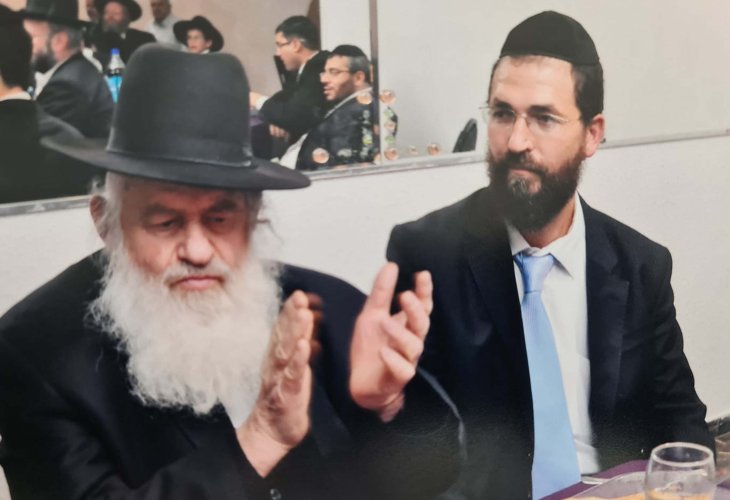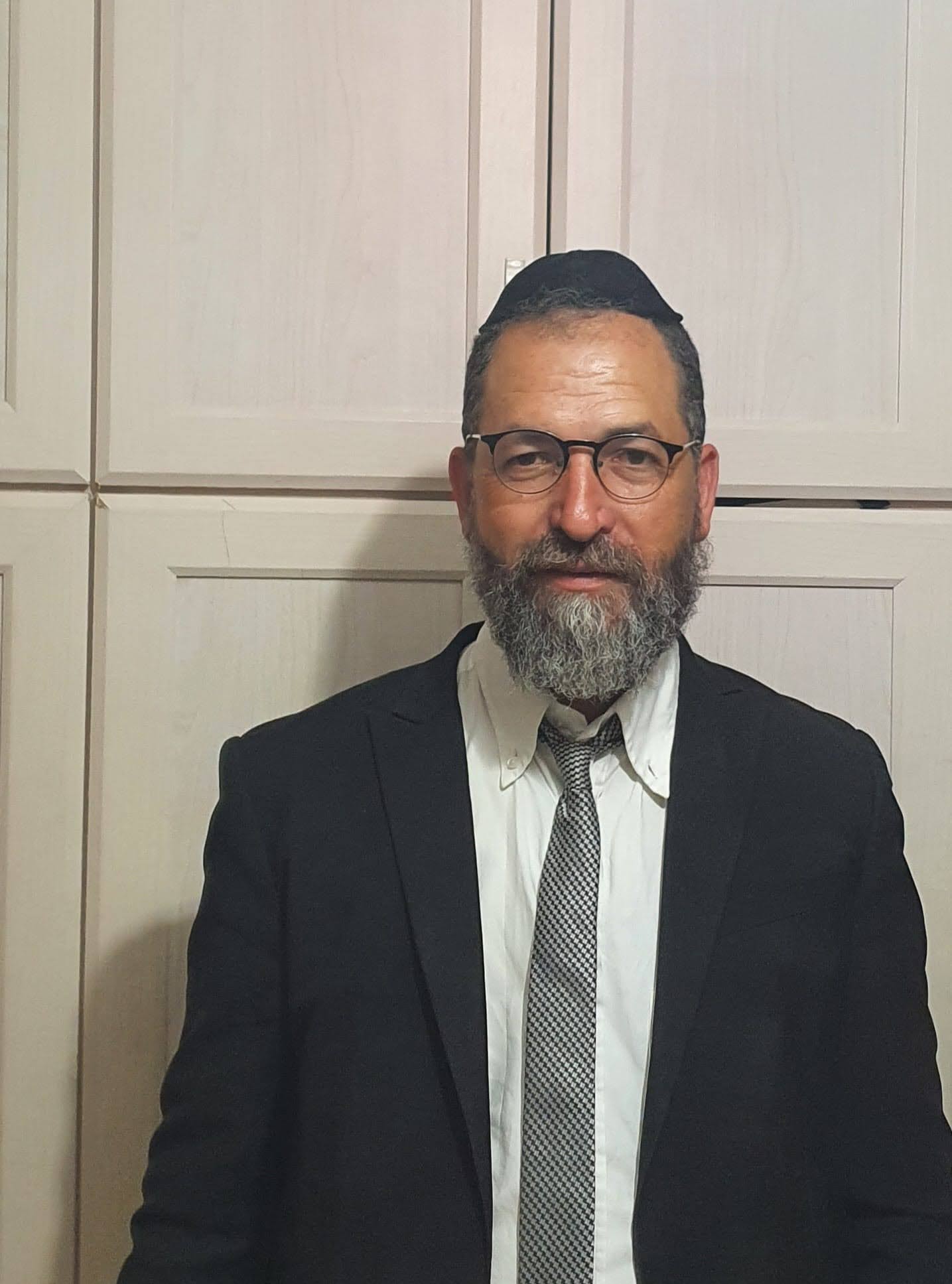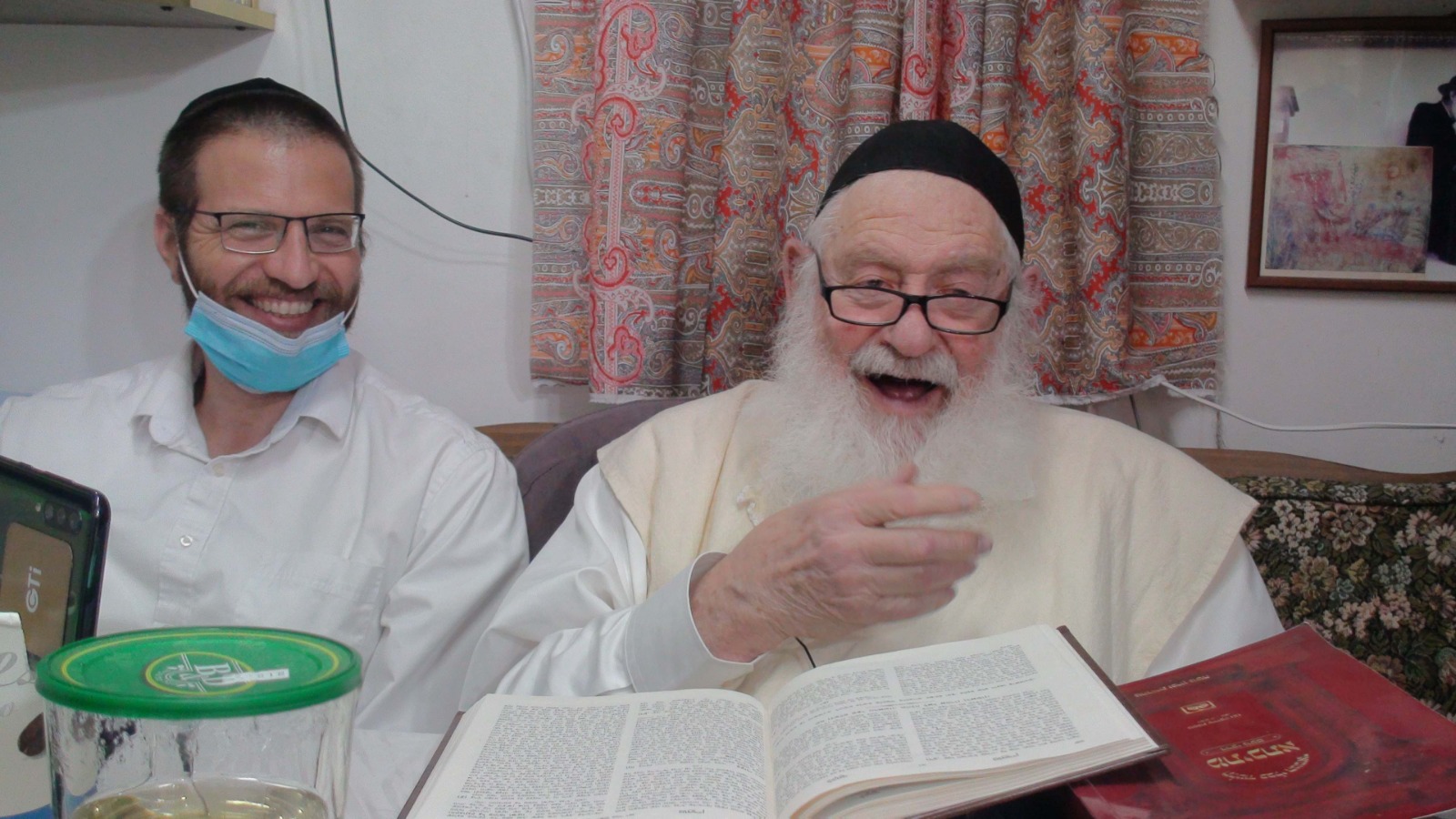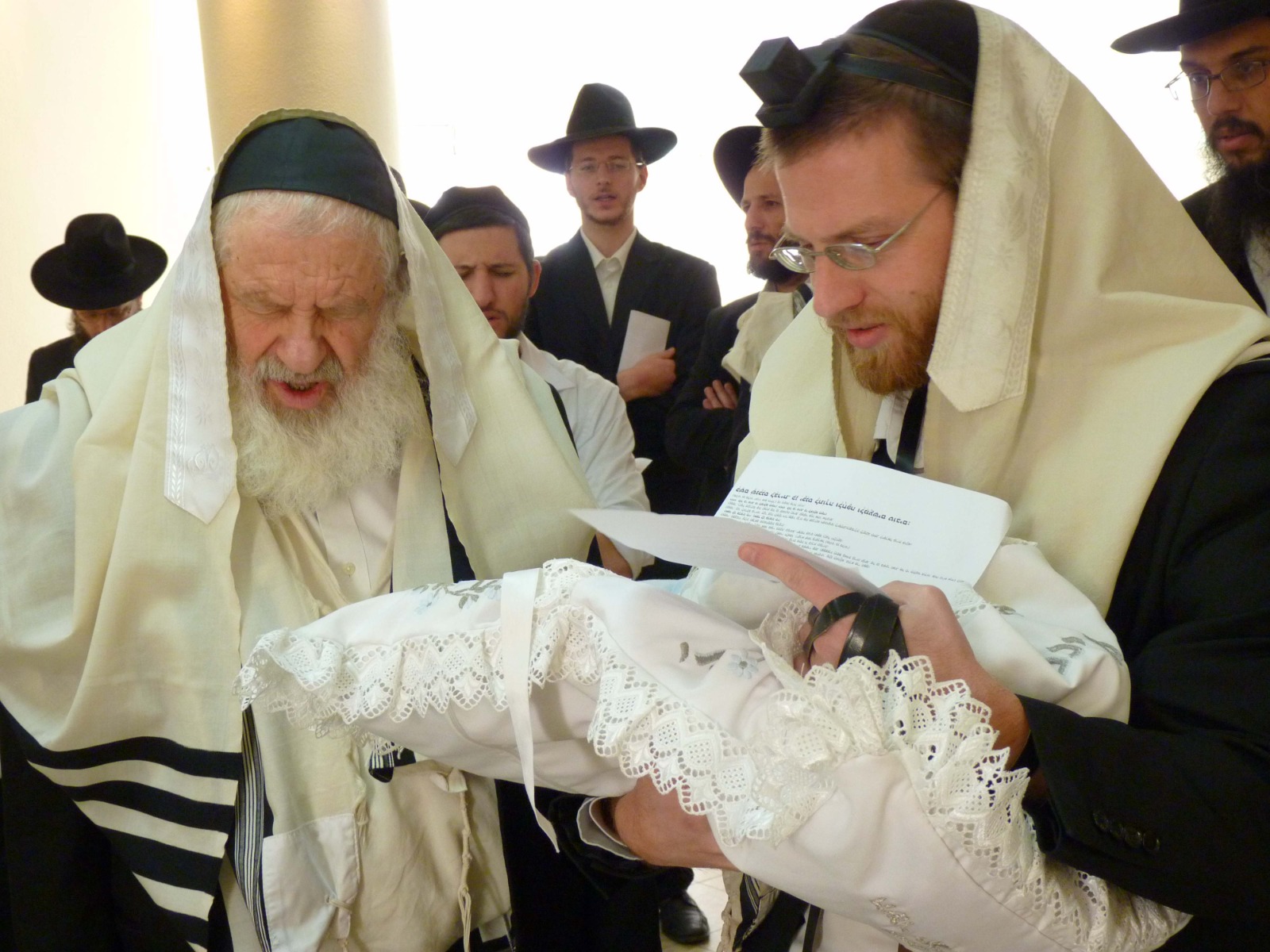The Light and Radiance: Followers of Rabbi Uri Zohar zt"l in an Elevated Interview on His Unimaginable Greatness
How did Rabbi Uri Zohar touch the hearts of a group of at-risk teenagers who came to hear him speak? What request did Rabbi Ovadia Yosef make when they met? How did he penalize himself if he didn't wake on time? Rabbi Shimon Shachar, Rabbi Dan Tyomkin, and Sivan Rahav Meir offer insights in his memory.
 With Rabbi Shimon Shachar
With Rabbi Shimon ShacharLast week, the pure soul of Rabbi Uri Zohar zt"l ascended to the heavens. The famous director and actor, whose process of returning to religious observance shook an entire nation. The bold man of truth, who, after his return to Judaism, never ceased to bring others closer. The great scholar, who began his daily study sessions early in the morning. One who taught us all to embrace even those who left the path. In an emotional interview, his assistant Rabbi Shimon Shachar shares what Rabbi Ovadia Yosef requested with tears and recounts the brief words he spoke to a group of 400 young people who had left the path. Rabbi Dan Tyomkin adds about his great perseverance in Torah, and Sivan Rahav-Meir speaks of a perpetual Sinai experience that unfolded in his small home on Zikhron Ya'akov Street.
Torah, Humility, Kindness
Rabbi Shimon Shachar, who works with struggling youth at the "Binu" center of the Jerusalem Municipality, was Rabbi Uri Zohar's right hand for 25 years. He produced Rabbi Zohar's television and radio programs and assisted him in registering children in religious institutions. "Rabbi Uri had an extraordinary level of integrity," he says. "His word was his bond, and he never deviated from the routines he set for himself at an almost inhuman level. Even if we returned at one o'clock at night from a conference or radio program, by three o'clock he was already starting his daily study routine. I recall hearing him once say in a phone call that if he didn't wake up on time, he wouldn't drink coffee or tea until noon."
 Rabbi Shimon Shachar
Rabbi Shimon ShacharHe had high expectations of himself
"Indeed, and in stark contrast, he was the complete opposite with others. Rabbi Zohar would speak to each person in a language that suited them and showed respect even to the simplest people. He loved them, and this simplicity won his heart. Over the years, many people came to consult with him in his small living room and left feeling they were significant to him and that he was close to them. Rabbi Zohar also dealt a lot with marital harmony and would often go to couples' homes to speak with the husband or wife. He had immense love for every Jew and did everything he could to help them."
The special relationship with every person can also be learned from a habit he established for himself. "A few years ago, doctors told him he needed to walk, and Rabbi Zohar committed to greeting every person he encountered," says Rabbi Shachar. "People who saw him didn't always understand why he greeted them. Some responded and then turned back to explain that they actually didn't know each other. There were occasionally amusing situations, but he didn't give up; it was his way of working on his character traits."
Moreover, Rabbi Zohar also supported various charitable projects. "Besides the organization he founded, which worked for the registration of children in religious institutions, he helped wherever possible. If a particular religious institution needed assistance in its establishment, or an additional building, Rabbi Uri was always there to help. Through him, various charitable organizations were established, and he himself had a fund for helping brides. People would send him letters, and he would send them money. All this while living a very modest life and loving this lifestyle."
Alongside a life of simplicity, 46 years of dedicated study left their mark. "Rabbi didn't make a big deal out of it, but he knew the Talmud remarkably well," recalls Rabbi Shachar. "In one of the broadcasts on Radio Darom, a Talmud professor came to speak with him. One might assume such a person would be familiar with the Talmud, but in reality, Rabbi Uri corrected him page by page. On trips, he always had an open book, studying the whole way. He also learned much Kabbalah, especially the writings of the Vilna Gaon and Ramchal."
Rabbi Dan Tyomkin, the creator of the Community for Parents of Struggling Youth, was also astonished by his dedication. "We once traveled for a lecture to parents of teenagers in the city of Netivot. Rabbi was already elderly, traveling was not easy for him, but when he heard there was a large audience needing help, he couldn't stand by. Throughout the lecture, Rabbi learned, but on the way back, it was already dark, and I first saw his headlamp, like those used by electricians. With that lamp, he continued to study in the dark. I remember being amazed by his ability to captivate audiences with charisma and persistently toil in Torah study, making use of every possible moment."
 Rabbi Uri Zohar zt''l with Rabbi Dan Tyomkin
Rabbi Uri Zohar zt''l with Rabbi Dan TyomkinWhat was his relationship with friends from the past?
"They thought he was leaving, period, but Rabbi Uri did not give up on them and maintained a close friendship," says Rabbi Shachar. "There were also some whom he influenced to follow him, like Alona Einstein, who moved to live near them, and later her two daughters married his sons. I remember a conversation I overheard between them a few days before her passing. Alona was then hospitalized and aware of what was coming. In that conversation, she spoke about her fear of standing before the heavenly court. Rabbi then opened the laws of repentance from Rambam and began learning with her. They essentially sat down to discuss how to prepare for that day. During the conversation, Rabbi said to her, 'Alona, you have merits,' and shared about his own process of returning to repentance. Honestly, I felt like a monkey next to humans. Seeing two people who were famous in their past, returned to Judaism, and lived the truth so strongly—where do I stand next to them?!"
Love the Children
In the last decade, the treatment of at-risk youth was at the forefront of Rabbi Zohar’s concerns. "At first, when he said we should accept these children with love, many people raised eyebrows. It seemed too permissive," recalls Rabbi Shachar. "But he boldly pursued the truth he learned through personal experience, dealing with his children. Soon after, entire groups began coming to learn from him how to handle youth properly, asking time and again in conferences for him to speak on this. Rabbi would tell people the words of the Zohar, about how during the time before the Messiah, souls are weak, and he explained that the youth are not doing this out of wrongdoing but out of difficulty and weakness. 'We need to understand them and approach them with great patience,' he used to say, 'Parents should turn a blind eye, not pry into what the child is doing, and not search for them too much. It’s a long-term patience, but it keeps them with us. Just don’t pressure them; eventually, they will return.'"
On one occasion, Rabbi was invited to speak before a group of 400 young men and women who grew up in ultra-Orthodox homes and left the path. "It was in Lakewood, and on the way, Rabbi said to me, 'I’m 80 years old, what will I tell them? I no longer speak their language; it’s a different generation.' However, when we got there, he spoke briefly and to the point and said, 'Know two things: the first is that Hashem is not ultra-Orthodox, and the second is that He loves you. Remember that for life.' These short words touched them deeply, and it was evident how the fear of a connection with Hashem was released. It gave them the opportunity to stay connected without official labels."
Over the years, Rabbi wrote the book 'Fathers on Sons' on the subject. "At first, when the book came out, Rabbi didn’t ask for endorsements," says Rabbi Shachar. "When I asked him why, he replied that the book is subject to criticism and doesn't obligate anyone. Those who want can learn from it, and those who don’t - don’t have to. The book sold relatively modestly at first and wasn’t reprinted immediately. Only a few years later, it began to gain wider recognition, and then Rabbi agreed to seek endorsements from other rabbis. The book reached thousands of families, and many people learned from it how to properly engage with their children."
The book 'Boser HaMelachim' was also written with his encouragement. "Rabbi asked me to provide all the practical steps for dealing with at-risk youth," says Rabbi Dan Tyomkin. "Our connection began when I wrote a guidebook for returnees to Judaism and requested his endorsement. At first, he tried to avoid it, explaining he felt unworthy, but when he saw how important it was to me, he agreed to my request. Since then, we had a regular study session every Saturday night, and sometimes extended to other times. I used to consult him even on small and personal matters. I saw in him a combination of a great person, completely devoted to Hashem, and at the same time, kind-hearted, interested, helpful, and merciful to an indescribable degree."
 At the brit of Dan Tyomkin's son
At the brit of Dan Tyomkin's sonIn his later years, Rabbi Zohar rarely left his home. "We would bring groups of teenagers to the nearby synagogue, where they would hear him," says Rabbi Shachar. "He cared for the people of Israel until the last moment. Constantly, private individuals and requests for help from institutions came to him. I was responsible for filtering the numerous requests, and I remember a father, about four years ago, who repeatedly asked to speak with Rabbi. Eventually, I told him that on a specific day, Rabbi would be traveling from Jerusalem to the central area and asked him to call during that time. The father called and began describing the difficulties with his son. Another listener to that conversation was a young man looking for a ride, and Rabbi agreed to take him with them. A few minutes later, it turned out that the young man was none other than the father’s son. He heard the conversation with his father, and because of it, his heart opened. It was one of many times I saw how Rabbi had special divine assistance in helping people."
Speaking of Rabbi, one cannot fail to mention the great woman by his side. "She was very careful not to disturb him when learning and agreed that he would take phone calls only at certain times," says Rabbi Shachar. "Additionally, when there was a Torah class at their home, she made sure to serve food and drinks to everyone and didn't allow anyone to get up. It was important to her that they study with concentration, without walking back and forth. People would also consult her, and she did it all with great modesty. Rabbi also took care of her beyond measure; it was a profound and special connection of love."
"Rabbi Uri, Where Have You Disappeared To?"
The immense love for Rabbi was visible everywhere. "On one Yom Kippur evening, we traveled to broadcast on Radio Darom, but on the way, we got stuck in a massive traffic jam caused by an accident," says Rabbi Shachar. "A whole crew was waiting for him at the radio studio, but there was no other option, and Rabbi began to broadcast over the phone. A few cars ahead of us was a police patrol car in the jam, and I went over to them. I knocked on their window and discovered they were listening to Rabbi’s program. I told them he was a few cars back, and when they heard this, they got so excited that they decided to help us. They drove down the side of the road with their patrol car and asked us to follow them, allowing us to reach the studio quickly."
A special love was also shared by Rabbi Ovadia Yosef zt"l. "Shortly after the pirate radio stations went off the air, we visited Rabbi Ovadia to discuss opening new channels for publicizing Torah teachings. During that meeting, Rabbi Ovadia said tearfully: 'Rabbi Uri, we don’t hear you on the radio, where have you disappeared to? And why don’t you come to visit me more?' Later, they talked about registering children in religious institutions, and Rabbi Ovadia said: 'I have nothing in this world except for the children of Israel; they are the embodiment of my life. So I ask you, Rabbi Uri, to say now - one child on behalf of Ovadia Yosef.' Rabbi Uri jokingly replied, 'One child on behalf of Uri Zohar.' But Rabbi Ovadia persisted and said, 'Say one child on behalf of Ovadia Yosef.' He saw this act of bringing people closer as an enormous merit. When we left that moving visit, Rabbi Uri told me that he didn’t want to disturb Rabbi Ovadia's study, which is why he didn’t visit often. How much respect they had for each other!"
In conclusion, journalist Sivan Rahav-Meir, who interviewed Rabbi and visited his home many times, shares her personal feelings. "It's very symbolic to me that Rabbi Uri passed away on the eve of the Torah-giving celebration. To me, and this is no exaggeration, every visit to his small room was akin to a Sinai revelation. I know this sounds crazy to people; today, Judaism is very popular, it's in the feed, it's in the playlist, and that's great, but with him, it was something else. It wasn't another artist who strengthened or a celebrity who discovered the Torah. With him, it was truly as if Moses received the Torah from Sinai, and delivered it to Uri, where he was meant to study and teach. There was a piercing sense of truth when you left his house, nothing I can compare, perhaps really like the greats and the righteous. The pursuit of time, the seriousness, the learning, the thinking if every action would bear fruit, even when I interviewed him. He wouldn’t agree to an interview without a good reason, and as soon as the cameraman packed up the equipment, Rabbi Uri was already absorbed in a book. There was some humble and clear truth, also challenging and sometimes frightening, that I felt in each of my visits to his home. Until this week, the small house on Zikhron Ya'akov Street was a constant Sinai revelation."

